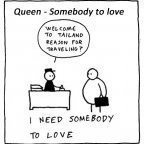Chinese Firm Eyes Elite Card Stake
-
Recently Browsing 0 members
- No registered users viewing this page.
-
Topics
-
-
Popular Contributors
-
-
Latest posts...
-
199
Border Thai and Cambodian Troops Clash Near Ta Muen Thom Temple
Can Thailands ageing F16’s evade Cambodias Surface to air missiles though -
2
Another Roundtoit Project Completed
I mentioned that they were over the boundary with the roof; they just laughed and said the fence is not straight. 555. Family land anyway, but ... -
199
Border Thai and Cambodian Troops Clash Near Ta Muen Thom Temple
Same boat myself. No PTSD but plenty of calculations of probability going on in my head. -
2
Report Bangkok's Living Costs Surge Ahead of Income, Creating Paradox
This imbalance is certainly concerning, but I'm not sure I see how it's a "paradox". It's a pretty common phenomenon in large cities worldwide, with low-wage workers having increasing difficulty being able to afford living where the jobs are. -
1
What is it like to retire in Nakhon Nayok?
What you see is what you get ... Pros ... hope you like nature and being outdoors, as half province is quite nice Cons ... other half is just farmland, and you'll need to self entertain. -
29
Report New Driving Licence Rule Causes Concern Among Expats in Pattaya
It literally says that in the op !
-
-
Popular in The Pub












Recommended Posts
Create an account or sign in to comment
You need to be a member in order to leave a comment
Create an account
Sign up for a new account in our community. It's easy!
Register a new accountSign in
Already have an account? Sign in here.
Sign In Now